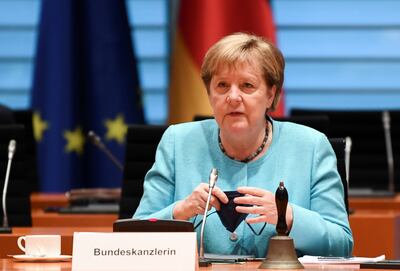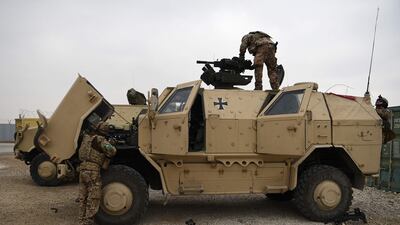German politicians are appealing directly to Chancellor Angela Merkel to ensure the safety of Afghan personnel who assisted Nato forces in the country.
Berlin says that hundreds of Afghan civilians have been granted residency in Germany after helping its troops during the 20-year war.
But Afghans and their former colleagues in the German armed forces say thousands are yet to receive visas while bureaucratic hurdles are leaving people in limbo.
With the Taliban on the march, a cross-party group of German MPs sent a letter to Ms Merkel urging her to take “moral responsibility” for the fate of Afghan staff.
“The clock is ticking and Germany is in danger of betraying its obligations to local personnel in Afghanistan,” they said.
“We are ashamed and bewildered by the way in which German government institutions are treating local staff who loyally and reliably served our country and worked for the safety of our troops over many years.”
The politicians said Germany’s reputation was at stake as they told Ms Merkel to speed up the application process for Afghans who fear reprisals from the Taliban.
They said Berlin should organise charter flights, take on the costs of travel to Germany and ensure the safety of more than 2,000 people without a visa.
The security situation in Afghanistan “is becoming more precarious every day and the danger to local personnel is rising", they said.
“We know that a country like Germany can afford this and it would be to our credit. Keeping our word is the order of the day. If nothing else, we owe it to these people that after their long and dangerous assignments for our military, we do not simply leave them to their fate.”
The letter was signed by the human rights spokesman of Ms Merkel’s own conservative bloc Michael Brand and his counterparts in the Green, Social Democratic and Free Democratic parties.
The chancellor’s spokesman Steffen Seibert said last week that Berlin was aware of its responsibility to Afghan personnel.
He said not all Afghans who were eligible for a visa wanted to move to Germany immediately.

The EU's foreign policy chief Josep Borrell said this week that the fighting in Afghanistan as Nato forces withdraw is having a grave effect on civilians.
The Taliban claims to control 85 per cent of Afghanistan and international concern about getting medicines and supplies into the country is increasing.
Critics of the German government say the procedure for residency in Germany is too restrictive.
German Interior Minister Horst Seehofer last month scrapped a rule requiring visa applicants to have worked for German forces in the last two years. But there is still a distinction between those who worked directly for the German military and those who were employed by other civilian agencies.
Britain faces similar pressure to look after Afghan interpreters who helped its troops during the 20-year deployment.
Some German soldiers who served during the Nato mission in Afghanistan are raising money to help Afghan personnel.
Marcus Grotian, who was posted to Afghanistan in 2011, said thousands had not yet received visas or were unable to apply. He founded a support network for the Afghans he said had put their lives on the line by helping Nato forces.
Volker Wieker, a German General and a former chief of staff of the armed forces, is a patron of the support group.
Asked how Ms Merkel saw the charity efforts, Mr Seibert said they showed the camaraderie between soldiers and Afghan personnel.
Germany, which sent more than 150,000 troops to Afghanistan, withdrew its remaining forces from the country late last month.
A total of 59 German soldiers were killed in the conflict.


